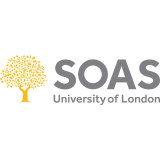
SOAS University of London is the only Higher Education institution in Europe specialising in the study of Asia, Africa and the Near and Middle East.
SOAS is a remarkable institution. Uniquely combining language scholarship, disciplinary expertise and regional focus, it has the largest concentration in Europe of academic staff concerned with Africa, Asia and the Middle East.
On the one hand, this means that SOAS scholars grapple with pressing issues - democracy, development, human rights, identity, legal systems, poverty, religion, social change - confronting two-thirds of humankind while at the same time remaining guardians of specialised knowledge in languages and periods and regions not available anywhere else in the UK.
SOAS is synonymous with intellectual enquiry and achievement. As a global academic base and a crucial resource for London, SOAS is distinctively positioned to analyse, understand and explain some of the most challenging issues facing us in the world today.
Their academic focus on the languages, cultures and societies of Africa, Asia and the Middle East makes us an indispensable interpreter in a complex world.
History;
The School was founded in 1916 as the School of Oriental Studies. It took its present title in 1938, by which time it had also established itself as a centre for African Studies. It moved to its present site in 1941.
The Scarbrough Report of 1946 recommended that the whole field of Asian and African studies should be developed in London in contrast to a restricted range of programmes in other universities, and there was a considerable expansion of the School’s activities. In addition, after the Hayter Report of 1961, increased attention was given to the development of the social sciences.
Its expanded library, designed by the architect Sir Denys Lasdun, was opened in 1973. This national resource houses more than 1.5 million items.
SOAS continues to maintain its position as the major national centre for the study of programmes concerned with Asia, Africa and the Middle East. New teaching posts have been established, student numbers have increased and the School’s status as a leading research institution has been enhanced.
